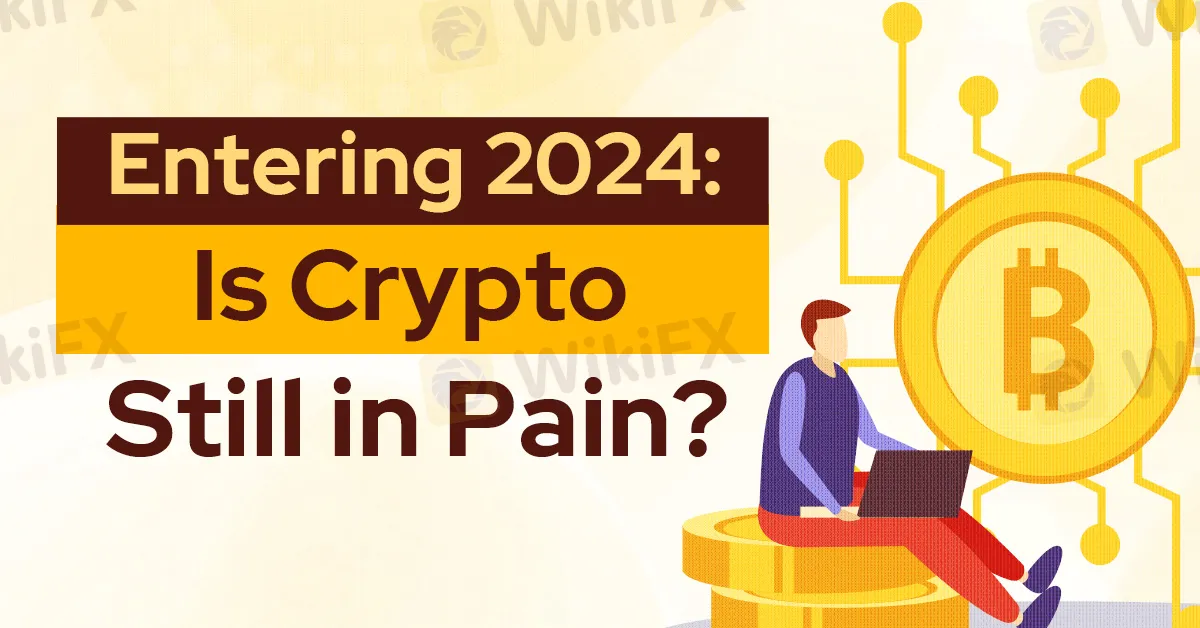简体中文
繁體中文
English
Pусский
日本語
ภาษาไทย
Tiếng Việt
Bahasa Indonesia
Español
हिन्दी
Filippiiniläinen
Français
Deutsch
Português
Türkçe
한국어
العربية
Entering 2024: Is Crypto Still in Pain?
Abstract:Crypto's 2023 hangover lingers, but amidst the carnage, hope whispers in the form of rising adoption, regulatory clarity, and blockchain's unwavering innovation as we approach 2024.

The year 2023 has been a brutal bear market for cryptocurrency. From the dizzying heights of November 2021, the entire market shed over 70% of its value, leaving investors licking their wounds and wondering what the future holds. As we inch closer to 2024, the question on everyone's mind is: is crypto still in pain, or is there light at the end of the tunnel?
2023 saw a perfect storm of negative factors batter the cryptosphere. Rising interest rates, macroeconomic uncertainty, and the collapse of major players like TerraUSD and FTX.com caused a domino effect, eroding confidence and triggering panic selling. Bitcoin, the bellwether of the market, plunged from its all-time high of nearly $69,000 to hover around $17,000 at the time of writing. Altcoins fared even worse, with many plummeting by 90% or more.
The psychological impact of this bear market cannot be overstated. Many investors, particularly newcomers, have been burned, leading to widespread fear and skepticism. This sentiment, coupled with the ongoing regulatory scrutiny and the potential for further industry shakeouts, casts a shadow of uncertainty over the immediate future.
Despite the current pain, there are reasons to believe that crypto might not be down for the count. The underlying technology, blockchain, continues to evolve and find new applications beyond just speculation. Institutional adoption, albeit slow, is steadily increasing, with major financial players like BlackRock and Goldman Sachs dipping their toes into the water. Additionally, the recent crackdown on bad actors like FTX could ultimately lead to a healthier and more transparent industry in the long run.

Predicting the future of a notoriously volatile market like crypto is always a fool's errand. However, we can identify some key trends that might shape the landscape in 2024:
Regulatory landscape: Regulatory clarity will be crucial. Clearer rules could entice hesitant investors and institutions, while overly restrictive regulations could stifle innovation.
Technological advancements: Continued development of Layer 2 solutions and advancements in scalability could address some of the technical hurdles hindering wider adoption.
Focus on fundamentals: The focus might shift from speculation to real-world use cases and projects with strong underlying value propositions.
Important Disclaimer:
This article is for informational purposes only and does not constitute financial advice. Past performance is not indicative of future results. Investing in cryptocurrency involves significant risk, and you could lose all of your investment. Please conduct your own research and consult with a qualified financial advisor before making any investment decisions.

Disclaimer:
The views in this article only represent the author's personal views, and do not constitute investment advice on this platform. This platform does not guarantee the accuracy, completeness and timeliness of the information in the article, and will not be liable for any loss caused by the use of or reliance on the information in the article.
Read more

Bybit Shuts Down NFT Marketplace Amid Crypto Market Downturn
Bybit announces the closure of its NFT marketplace, citing efforts to streamline offerings. Discover the latest trends in the declining NFT market and its shift to utility-based growth.

Galaxy Digital Settles $200M in Luna Token Manipulation Case
Galaxy Digital pays $200M to settle Luna token manipulation probe by NY regulators, linked to TerraUSD’s 2022 crash, impacting crypto market stability.

Vanuatu Passes VASP Act to Regulate Crypto and Digital Assets
Vanuatu's new VASP Act regulates crypto businesses, enforcing strict licensing, AML/CFT compliance, and investor protections.

Blockchain Decentralization: Empowering a Trustless Future
In recent years, blockchain technology has rapidly evolved from a niche innovation behind Bitcoin into a transformative force across industries. At its core, blockchain decentralization refers to the distribution of authority and decision-making away from a central entity and into the hands of a distributed network of participants. This shift redefines how data is stored and verified and paves the way for trustless, transparent, and resilient systems that challenge traditional centralized models.
WikiFX Broker
Latest News
The Withdrawal Trap: How Scam Brokers Lure Victims into Paying More
FCA to Investors: Think Twice Before Trusting These Brokers
Trump\s tariffs: How could they affect the UK and your money
Trump gambles it all on global tariffs he\s wanted for decades
TradingView Brings Live Market Charts to Telegram Users with New Mini App
Trump tariffs: How will India navigate a world on the brink of a trade war?
IG Group Acquires Freetrade for £160M to Expand UK Investment Market
U.S. March ISM Manufacturing PMI Released
Should You Beware of Forex Trading Gurus?
Vanuatu Passes VASP Act to Regulate Crypto and Digital Assets
Currency Calculator







